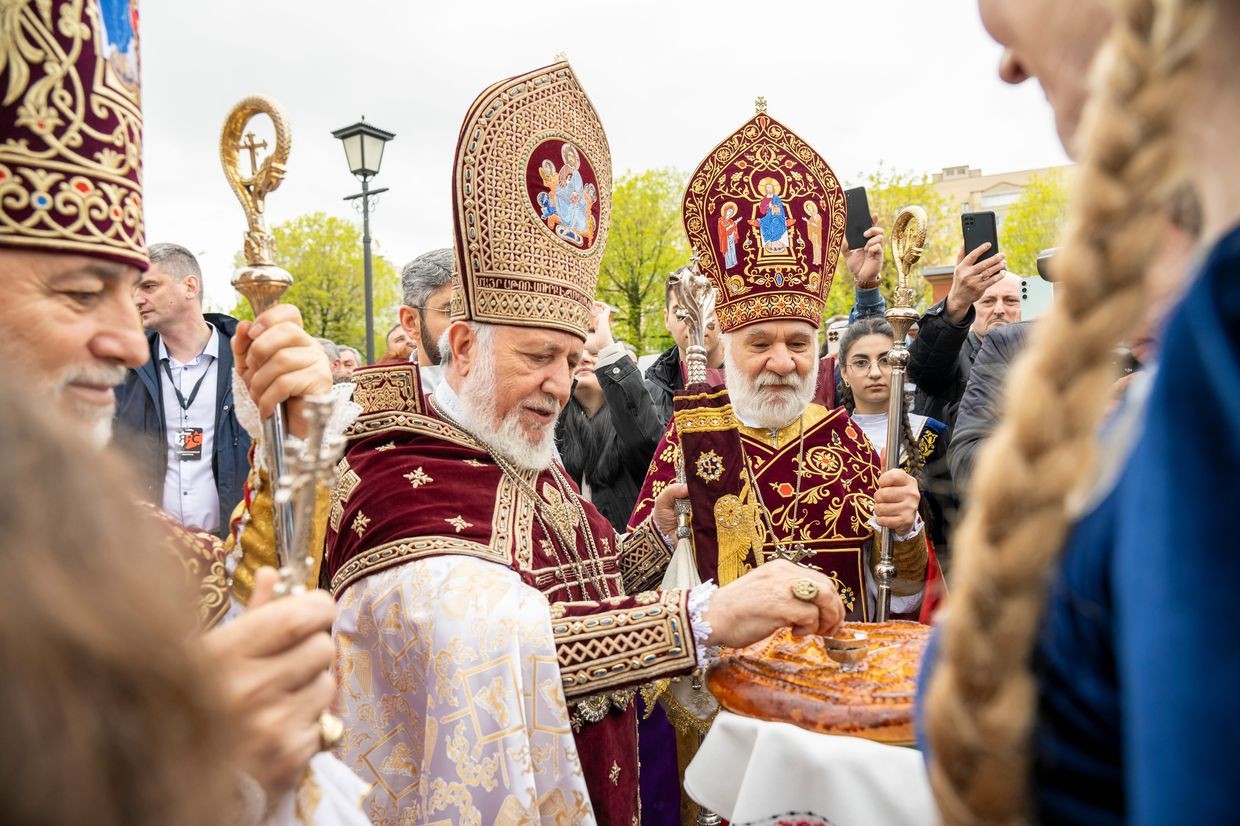
The head of the Armenian Apostolic Church, Karekin II, Supreme Patriarch and Catholicos of All Armenians, has visited Minsk to consecrate the country’s first such church. It was his first visit to Belarus, which comes amidst tense relations between Armenian President Nikol Pashinyan and his Belarusian counterpart Aliaksandr Lukashenka.
The first Armenian Apostolic Church in Belarus — Gregory the Illuminator’s Church — was officially consecrated and opened in Minsk on Sunday. The building was designed by Armenian architect Samvel Makyan, with construction beginning in August 2022 and ending in April 2025.
According to the Belarusian state-owned news agency BelTA, citing Armenian priest Sarkis, the church’s superior father, the building was constructed using volcanic rock imported from Armenia, while the interior design used Armenian travertine stones as well. The icons were all imported from Armenia as well.
‘It will always remind us of the Motherland’, Sarkis said.
He additionally noted that services would be organised every Sunday, with daily prayers in Armenian potentially organised in the future.
According to the Mother See of Holy Etchmiadzin, during the consecration ceremony, Karekin II highlighted that relations between Armenians and Belarusians ‘are anchored on the common values of Christian identity, friendship, traditional perceptions of homeland and family, as well as the precious memories of joint struggles and feats’, while sharing his hope that through Armenians living in Belarus, the ties between the two nations would further strengthen.
He also noted that the construction of the church became possible ‘thanks to the goodwill of the authorities of Belarus’, adding that it would bring ‘new vitality to the national and ecclesiastical life of the community’.
In turn, Belarusian Commissioner for Religions and Nationalities Aliaksandr Rumak told BelTA that Armenians make up the sixth largest ethnicity in Belarus, with a population of over 9,500.
‘Belarus is a country of peace and accord. People of different confessions and ethnicities live here. There are no disagreements and contradictions between them’, Rumak said, adding that ‘our country can be an example for other states, where, as we know, many conflicts start precisely because of religious contradictions’.
In addition to consecrating the church, Karekin II also laid flowers at the Victory Monument in Minsk, noting that it was a ‘great honour’ for him.
‘Belarus endured a difficult trial and suffered immense losses [in World War II], yet it also made a significant contribution to the victory over fascism. Over 50,000 Armenians participated in the battles on the Belarusian front’, News.by reported Karekin II as saying.
The opening of an Armenian church in Belarus comes amidst steadily deteriorating ties between Armenia and Belarus.
Most notably, in June 2024, Pashinyan declared that no Armenian officials would visit Belarus while Lukashenka was in power, due to the latter’s support for Azerbaijan during the Second Nagorno-Karabakh War.
Shortly after, Politico published a report based on leaked documents detailing the alleged supply of advanced military hardware from Belarus to Azerbaijan between 2018 and 2022.
During this period Azerbaijan launched the Second Nagorno-Karabakh War and finalised its military victory after Nagorno-Karabakh’s surrender in September 2023.
Several other major clashes took place on the Azerbaijan–Armenia border in 2021 and 2022 in which Azerbaijan gained control over 150 square kilometres of territory inside Armenia, according to Yerevan.
Relations between the Armenian government and the Armenian Apostolic Church have also been rocky since Pashinyan came to power in 2018.
In 2020, following Armenia’s defeat in the Second Nagorno-Karabakh War, Karekin II joined calls for Pashinyan’s resignation. He reiterated such calls in 2023, leading Pashinyan to state that ‘if the church wants to carry out political activities, Armenia is a democratic country’.
The church also condemned the ‘dangerous and unacceptable positions adopted by the authorities’ in May 2023, following Pashinyan’s statement that Armenia was ready to recognise Nagorno-Karabakh as part of Azerbaijan.











